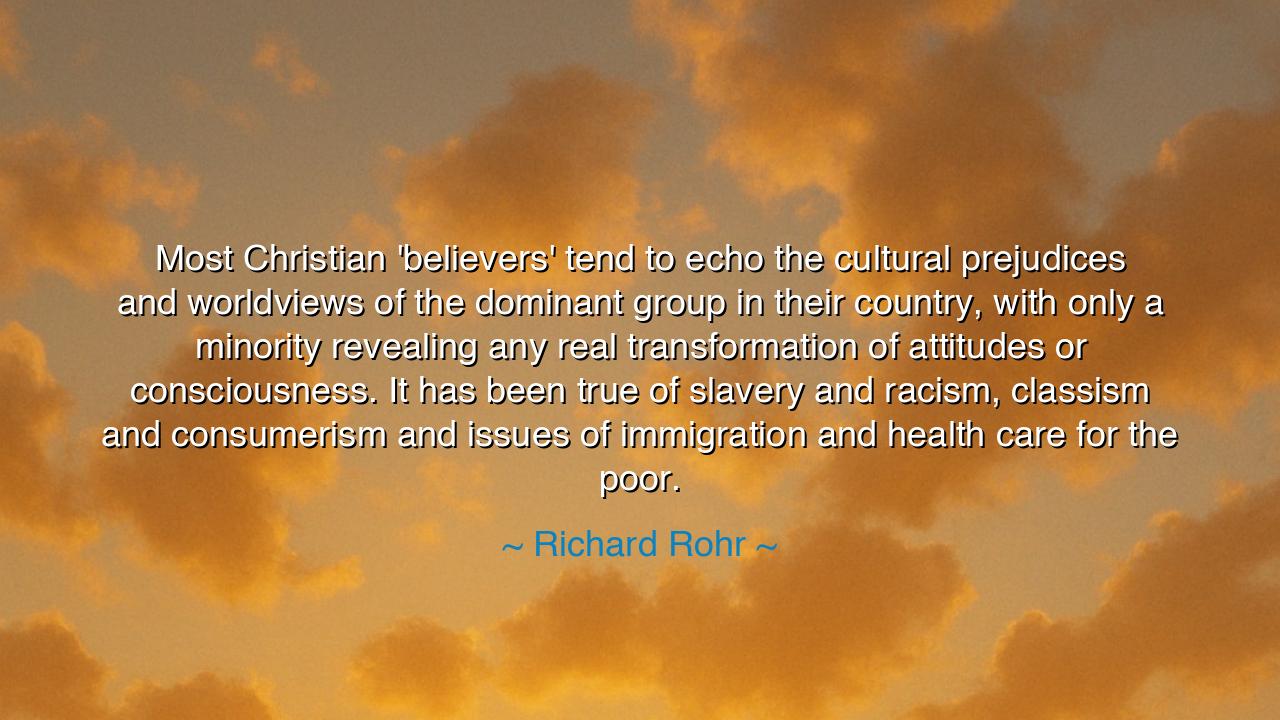
Most Christian 'believers' tend to echo the cultural prejudices
Most Christian 'believers' tend to echo the cultural prejudices and worldviews of the dominant group in their country, with only a minority revealing any real transformation of attitudes or consciousness. It has been true of slavery and racism, classism and consumerism and issues of immigration and health care for the poor.






The mystic and teacher Richard Rohr, a voice of spiritual depth in an age of noise, once said with piercing honesty: “Most Christian ‘believers’ tend to echo the cultural prejudices and worldviews of the dominant group in their country, with only a minority revealing any real transformation of attitudes or consciousness. It has been true of slavery and racism, classism and consumerism and issues of immigration and health care for the poor.” In this statement, Rohr does not condemn faith itself, but the failure to let faith transform the heart. His words strike like a bell of truth through the ages, reminding us that to believe in God is not merely to repeat the creeds of one’s culture, but to awaken to divine compassion—a force that transcends all human boundaries.
Rohr’s insight springs from a lifetime of observation. He has seen how religion, instead of liberating the soul, is often co-opted by the powers of comfort and conformity. Many, he says, mistake belief for conversion—as though repeating words or attending rituals were the same as seeing the world through the eyes of love. But true conversion is something deeper: it is a transformation of consciousness, a breaking open of the heart that allows the light of truth to dissolve prejudice, greed, and fear. To be Christian, in Rohr’s view, is to follow the path of Christ-consciousness—a way of seeing the divine in the oppressed, the stranger, the poor, and the forgotten.
Throughout history, we have seen how faith can either uplift or enslave. During the dark centuries of slavery, many who called themselves Christian used scripture to justify cruelty, while a courageous few, like William Wilberforce and Harriet Tubman, heard a truer gospel—the gospel of liberation. These were the ones Rohr speaks of as the “minority” whose hearts were transformed. While the masses conformed to the dominant voice of empire, they chose to listen instead to the whisper of the Spirit, which cries for justice. It was this divine whisper that freed nations and awakened consciences, yet even today, Rohr reminds us, the struggle continues—against new forms of bondage called racism, classism, and consumerism.
When Rohr names these evils—consumerism and classism, immigration and health care for the poor—he points to the subtle idols of modern civilization. Where the ancients bowed to golden statues, we now bow to markets, comfort, and privilege. The tragedy, he says, is that religion too often blesses these idols rather than breaking them. The rich thank God for their wealth while ignoring the sick who die without medicine. The comfortable quote scripture but close their doors to the refugee. Thus, the faith meant to transform society instead becomes its mirror, reflecting back the very prejudices it was born to heal.
Yet Rohr’s words are not a curse—they are a call to awakening. He invites each soul to see that spirituality is not belonging to a group, but belonging to God’s truth, which always breaks the boundaries of tribe and nation. He asks: what good is faith if it does not make us more merciful? What good is prayer if it does not open our hands to the poor? To be truly Christian—or truly human—is to stand apart from the blindness of the crowd and to let divine compassion rewire our very seeing. Such transformation is not easy. It demands the courage to examine one’s assumptions, to love those whom society has taught us to fear, and to serve without seeking reward.
Consider the life of St. Francis of Assisi, whom Rohr himself reveres. Born into wealth, Francis abandoned privilege to live among the lepers and beggars. He heard in their suffering the voice of Christ. While the Church of his day grew fat on riches and power, Francis walked barefoot in humility, showing that real faith means living the gospel, not just speaking it. He became, in his poverty, the richest of all—his consciousness utterly transformed. So too must we become instruments of peace in an age that values possession over compassion, status over service, rhetoric over love.
The lesson, then, is clear: do not let your soul become a mirror of your culture—become its light. Faith is not meant to make you comfortable; it is meant to make you awake. Seek not the approval of the powerful, but the truth that liberates all beings. Examine your prejudices. Notice where your comforts blind you to others’ pain. Practice generosity, empathy, and justice as acts of worship. The transformation Rohr speaks of begins not in churches or governments, but in each awakened heart that dares to see differently.
So, children of every creed, remember Richard Rohr’s wisdom. The true believer is not one who simply agrees with doctrine, but one whose heart has been transformed by love. Let your spirituality be a force of healing, not division; of action, not complacency. For when faith becomes compassion, when belief becomes service, when consciousness expands beyond the self, then the world begins to change—and the kingdom of heaven, which Christ spoke of, ceases to be a promise of the next world and becomes a reality in this one.






AAdministratorAdministrator
Welcome, honored guests. Please leave a comment, we will respond soon